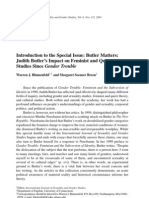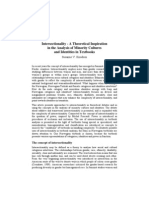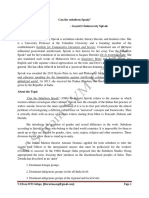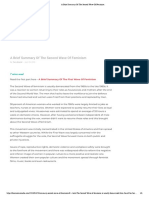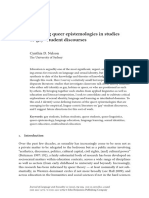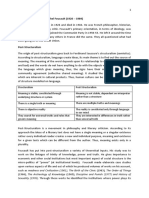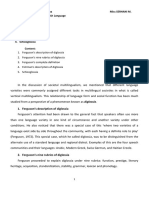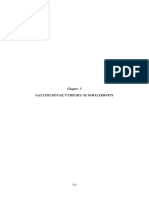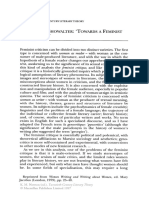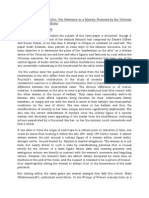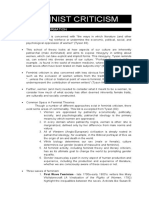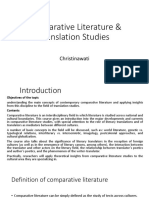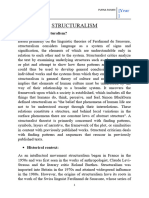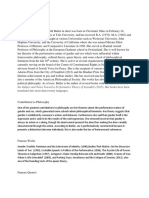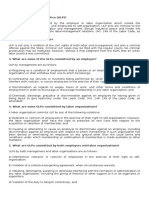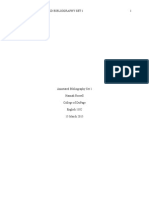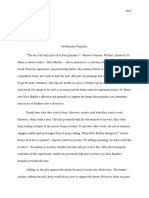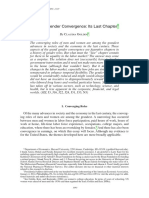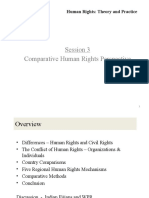Judith Butler
Judith Butler
Uploaded by
Osiel HdzCopyright:
Available Formats
Judith Butler
Judith Butler
Uploaded by
Osiel HdzCopyright
Available Formats
Share this document
Did you find this document useful?
Is this content inappropriate?
Copyright:
Available Formats
Judith Butler
Judith Butler
Uploaded by
Osiel HdzCopyright:
Available Formats
Judith Butler
Judith Butler
Judith Butler
Born
February 24, 1956 Cleveland, Ohio, U.S. 20th / 21st-century philosophy Western philosophy Continental philosophy, Third-wave feminism, Critical theory, Queer theory, Postmodernism, Post-structuralism
Era Region School
Maininterests Feminist theory, Political philosophy, Ethics, Psychoanalysis, Discourse, Embodiment, Sexuality, Jewish philosophy Notableideas Sex and gender as social construction, gender performativity
Part of a series on
Feminist philosophy
Major works
A Vindication of the Rights of Woman (1792) The Subjection of Women (1869) The Second Sex (1949) Gender Trouble (1990) Notable theorists
Mary Wollstonecraft Simone de Beauvoir Judith Butler Important concepts
Feminism Gender Equality Performativity
e [1]
v t
Judith Butler Judith Butler (born February 24, 1956) is an American philosopher and gender theorist, whose work has had a significant influence on the fields of feminist, queer, and literary theory, philosophy, political philosophy, and ethics. Butler is Maxine Elliot Professor in the Departments of Rhetoric and Comparative Literature and the Co-director of the Program of Critical Theory at the University of California, Berkeley, where she has taught since 1993. She is perhaps best known for her works Gender Trouble: Feminism and the Subversion of Identity and Bodies That Matter: On the Discursive Limits of "Sex," where she challenges the sex/gender distinction and develops her theory of gender performativity. Indeed, Butler's conception of gender performativity has shaped the scholarship of an entire generation in feminist and queer studies. Her books include Subjects of Desire: Hegelian Reflections in Twentieth Century France (1987, 1999), Gender Trouble: Feminism and the Subversion of Identity (1990, 2007), Bodies that Matter: On the Discursive Limits of "Sex" (1993, 2011), Excitable Speech: A Politics of the Performative (1997), The Psychic Life of Power: Theories in Subjection (1997), Antigones Claim: Kinship Between Life and Death (2000), Undoing Gender (2004), Precarious Life: Powers of Violence and Mourning (2004), Giving an Account of Oneself (2005), Krieg und Affect (2009), Frames of War: When is Life Grievable? (2009). Her most recent monograph is Parting Ways: Jewishness and the Critique of Zionism (2012). All of her books have been translated into numerous languages; Gender Trouble, alone, has been translated into twenty-seven different languages. In addition, she has co-authored and edited over a dozen volumes the most recent of which is Dispossession: The Performative in the Political (2013), coauthored with Athena Athanasiou. Over the years she has also published many influential essays, interviews, and public presentations. Butler is considered by many as "one of the most influential voices in contemporary political theory,"[2] and as the most widely read and influential gender theorist in the world. Butler has received honorary degrees from St. Andrews University (2013); McGill University (2013); Universit Paris VII (2011); University Bordeaux-III (2011), and Grinnell College (2008). She is the recipient of a range of awards, including the Theodor W. Adorno Award (2012), the Andrew W. Mellon Foundation's Distinguished Achievement Award (2008), two American Council of Learned Society Fellowships (2008, 1988), a Ford Foundation Fellowship (2008), the Brudner Memorial Prize for Lifetime Achievement for contributions to Lesbian and Gay Studies from Yale University (2004), a Laurence Rockefeller Fellowship (2001), a Guggenheim Fellowship (1999), as well as a Fulbright-Hays Scholarship (1978). She has been a member in the School of Social Sciences at the Institute for Advanced Study, Princeton (198788), and received an Andrew Mellow Postdoctoral fellowship in the Humanities Center at Wesleyan University (198586). Butler has had visiting appointments at Birkbeck, University of London (2000-), Columbia University (2012, 2013), The New School (2011), the cole Normale Suprieure (2008), the University of Amsterdam (2002), Princeton University (2001), Stanford University (1998), and York University (1991). Until 2011, she was also the Hannah Arendt Professor of Philosophy at the European Graduate School, and from 2003 to 2007 she was the Andrew White Professor at Large at Cornell University. She has been an invited plenary speaker in diverse venues and delivered public lectures in North and South American, Europe, Eastern Europe, the Middle East, and Asia. Butler has also been outspoken on many contemporary political issues. She has been active in lesbian and gay rights, and, more recently, she has engaged with the question of Palestine/Israel. She is a vocal critic of Israeli politics and has repeatedly emphasized that Israel does not represent all Jews.
Early life and education
Butler was born in Cleveland, Ohio, to a family of Hungarian and Russian Jewish descent. Most of her maternal grandmother's family perished in the Holocaust. As a child and teenager, she attended both Hebrew school and special classes on Jewish ethics, where she received her "first training in philosophy." Butler stated in a 2010 interview with Haaretz that she began the ethics classes at the age of 14 and that they were created as a form of punishment by her Hebrew school's Rabbi because she was "too talkative in class." Butler also stated that she was "thrilled" by the idea of these tutorials, and when asked what she wanted to study in these special sessions, she
Judith Butler responded with three questions preoccupying her at the time: "Why was Spinoza excommunicated from the synagogue? Could German Idealism be held accountable for Nazism? And how was one to understand existential theology, including the work of Martin Buber?" Butler attended Bennington College and then Yale University where she studied philosophy, receiving her B.A. in 1978 and her Ph.D. in 1984. She taught at Wesleyan University, George Washington University, and Johns Hopkins University before joining University of California, Berkeley, in 1993. In addition, she joined the department of English and Comparative Literature at Columbia University as a visiting professor in the spring semesters of 2012 and 2013 and has the option of remaining as full-time faculty. Butler currently lives in Berkeley, California, with her partner, the political scientist Wendy Brown, and their son, Isaac.
Overview of major works
Performative Acts and Gender Constitution (1988)
Butler begins to develop the arguments of the performativity of gender in this essay, which is later expanded upon and continues to work through in the book Gender Trouble. Butler uses Freud's notion of how a person's identity is modeled in terms of the normal. She revises Freud's notion of this concept's applicability to lesbianism, where Freud says that lesbians are modeling their behavior on men, the perceived normal or ideal. She instead says that all gender works in this way of performativity and a representing of an internalized notion of gender norms.[3] Butler argues for a performative understanding of gender, as opposed to the idea that gender performance is an expression of some sort of innate or natural gender. Butler argues that the performance of gender, itself creates gender. Additionally, she compares the performativity of gender to the performance of the theater. She brings many similarities, including the idea of each individual functioning as an actor of their gender. However she also brings into light a critical difference between gender performance in reality and theater performances. She explains how the theater is much less threatening and does not produce the same fear that gender performances often encounter because of the fact that there is a clear distinction from reality within the theater.
Gender Trouble: Feminism and the Subversion of Identity (1990)
Gender Trouble was first published in 1990, selling over 100,000 copies internationally and in different languages [citation needed] . Alluding to the similarly named 1974 John Waters film Female Trouble starring the drag queen Divine, Gender Trouble critically discusses the works of Simone de Beauvoir, Julia Kristeva, Sigmund Freud, Jacques Lacan, Luce Irigaray, Monique Wittig, Jacques Derrida, and, most significantly, Michel Foucault. The book has also enjoyed widespread popularity outside of traditional academic circles, even inspiring an intellectual fanzine, Judy![4] The crux of Butler's argument in Gender Trouble is that the coherence of the categories of sex, gender, and sexualitythe natural-seeming coherence, for example, of masculine gender and heterosexual desire in male bodiesis culturally constructed through the repetition of stylized acts in time. These stylized bodily acts, in their repetition, establish the appearance of an essential, ontological "core" gender. [citation needed] This is the sense in which Butler famously theorizes gender, along with sex and sexuality, as performative. The performance of gender, sex, and sexuality, however, is not a voluntary choice for Butler, who locates the construction of the gendered, sexed, desiring subject within what she calls, borrowing from Foucault's Discipline and Punish, "regulative discourses." These, also called "frameworks of intelligibility" or "disciplinary regimes," decide in advance what possibilities of sex, gender, and sexuality are socially permitted to appear as coherent or "natural." [citation needed] Regulative discourse includes within it disciplinary techniques which, by coercing subjects to perform specific stylized actions, maintain the appearance in those subjects of the "core" gender, sex and sexuality the discourse itself produces.[5]
Judith Butler A significant yet sometimes overlooked part of Butler's argument concerns the role of sex in the construction of "natural" or coherent gender and sexuality. Butler explicitly challenges biological accounts of binary sex, reconceiving the sexed body as itself culturally constructed by regulative discourse.[6] The supposed obviousness of sex as a natural biological fact attests to how deeply its production in discourse is concealed. The sexed body, once established as a natural and unquestioned fact, is the alibi for constructions of gender and sexuality, unavoidably more cultural in their appearance, which can purport to be the just-as-natural expressions or consequences of a more fundamental sex. On Butler's account, it is on the basis of the construction of natural binary sex that binary gender and heterosexuality are likewise constructed as natural.[7] In this way, Butler claims that without a critique of sex as produced by discourse, the sex/gender distinction as a feminist strategy for contesting constructions of binary asymmetric gender and compulsory heterosexuality will be ineffective.[8] Thus, by showing both terms gender and sex as socially and culturally constructed, Butler offers a critique of both terms, even as they have been used by feminists. Butler argued that feminism made a mistake in trying to make women a discrete, ahistorical group with common characteristics. Butler said this approach reinforces the binary view of gender relations because it allows for two distinct categories: men and women. Butler believes that feminists should not try to define women and she also believes that feminists should focus on providing an account of how power functions and shapes our understandings of womanhood not only in the society at large but also within the feminist movement. Finally, Butler aims to break the supposed links between sex and gender so that gender and desire can be flexible, free floating and not caused by other stable factors. The idea of identity as free and flexible and gender as a performance, not an essence, is one of the foundations of Queer Theory.
Bodies That Matter: On the Discursive Limits of "Sex" (1993)
Bodies That Matter seeks to clear up readings and supposed misreadings of performativity that view the enactment of sex/gender as a daily choice.[9] To do this, Butler emphasizes the role of repetition in performativity, making use of Derrida's theory of iterability, a form of citationality, to work out a theory of performativity in terms of iterability: Performativity cannot be understood outside of a process of iterability, a regularized and constrained repetition of norms. And this repetition is not performed by a subject; this repetition is what enables a subject and constitutes the temporal condition for the subject. This iterability implies that 'performance' is not a singular 'act' or event, but a ritualized production, a ritual reiterated under and through constraint, under and through the force of prohibition and taboo, with the threat of ostracism and even death controlling and compelling the shape of the production, but not, I will insist, determining it fully in advance. Iterability, in its endless undeterminedness as to-be-determinedness, is thus precisely that aspect of performativity that makes the production of the "natural" sexed, gendered, heterosexual subject possible, while also and at the same time opening that subject up to the possibility of its incoherence and contestation.Wikipedia:Explain jargon
Excitable Speech: A Politics of the Performative (1997)
In Excitable Speech, Butler surveys the problems of hate speech and censorship. She argues that censorship is difficult to evaluate, and that in some cases it may be useful or even necessary, while in others it may be worse than tolerance. [citation needed] She develops a new conception of censorship's complex workings, supplanting the myth of the independent subject who wields the power to censor with a theory of censorship as an effect of state power and, more primordially, as the condition of language and discourse itself. [citation needed] Butler argues that hate speech exists retrospectively, only after being declared such by state authorities. In this way, the state reserves for itself the power to define hate speech and, conversely, the limits of acceptable discourse. In this connection, Butler criticizes feminist legal scholar Catharine MacKinnon's argument against pornography for its unquestioning acceptance of the state's power to censor. [citation needed]
Judith Butler Deploying Foucault's argument from The History of Sexuality Vol. 1, Butler claims that any attempt at censorship, legal or otherwise, necessarily propagates the very language it seeks to forbid. As Foucault argues, for example, the strict sexual mores of 19th century Western Europe did nothing but amplify the discourse of sexuality it sought to control.[10] Extending this argument using Derrida and Lacan, Butler claims that censorship is primitive to language, and that the linguistic I is a mere effect of an originary censorship. In this way, Butler questions the possibility of any genuinely oppositional discourse; "If speech depends upon censorship, then the principle that one might seek to oppose is at once the formative principle of oppositional speech". Butler also questions the efficacy of censorship on the grounds that hate speech is context-dependent. Citing J.L. Austin's concept of the performative utterance, Butler notes that words' ability to do things makes hate speech possible but also at the same time dependent on its specific embodied context. [citation needed] Austin's claim that what a word does, its illocutionary force, varies with the context in which it is uttered implies that it is impossible to adequately define the performative meanings of words, including hate, abstractly.[citation needed] On this basis, Butler rejects arguments like Richard Delgado's which justify the censorship of certain specific words by claiming the use of those words constitutes hate speech in any context. In this way, Butler underlines the difficulty inherent in efforts to systematically identify hate speech.
Undoing Gender (2004)
Undoing Gender collects Butler's reflections on gender, sex, sexuality, psychoanalysis and the medical treatment of intersex people for a more general readership than many of her other books. Butler revisits and refines her notion of performativity and focuses on the question of undoing "restrictively normative conceptions of sexual and gendered life". Butler discusses how gender is performed without one being conscious of it, but says that it does not mean this performativity is "automatic or mechanical". She argues that we have desires that do not originate from our personhood, but rather, from social norms. The writer also debates our notions of "human" and "less-than-human" and how these culturally imposed ideas can keep one from having a "viable life" as the biggest concerns are usually about whether a person will be accepted if his or her desires differ from normality. She states that one may feel the need of being recognized in order to live, but that at the same time, the conditions to be recognized make life "unlivable". The writer proposes an interrogation of such conditions so that people who resist them may have more possibilities of living.[11] In her discussion of intersex, Butler addresses the case of David Reimer, a person whose sex was medically "reassigned" from male to female after a botched circumcision at eight months of age. Reimer was "made" female by doctors, but later in life identified as "really" male, married and became a stepfather to his wife's three children, and went on to tell his story in As Nature Made Him: The Boy Who Was Raised as a Girl, which he wrote with John Colapinto. Reimer committed suicide in 2004.
Giving an Account of Oneself (2005)
In Giving an Account of Oneself, Butler develops an ethics based on the opacity of the subject to itself; in other words, the limits of self-knowledge. Primarily borrowing from Theodor Adorno, Michel Foucault, Friedrich Nietzsche, Jean Laplanche, Adriana Cavarero and Emmanuel Levinas, Butler develops a theory of the formation of the subject. She theorizes the subject in relation to the social a community of others and their norms which is beyond the control of the subject it forms, as precisely the very condition of that subject's formation, the resources by which the subject becomes recognizably human, a grammatical "I", in the first place. Butler accepts the claim that if the subject is opaque to itself the limitations of its free ethical responsibility and obligations are due to the limits of narrative, presuppositions of language and projection. "You may think that I am in fact telling a story about the prehistory of the subject, one that I have been arguing cannot be told. There are two responses to this objection. (1) That there is no final or adequate narrative reconstruction of the prehistory of the
Judith Butler speaking "I" does not mean we cannot narrate it; it only means that at the moment when we narrate we become speculative philosophers or fiction writers. (2) This prehistory has never stopped happening and, as such, is not a prehistory in any chronological sense. It is not done with, over, relegated to a past, which then becomes part of a causal or narrative reconstruction of the self. On the contrary, that prehistory interrupts the story I have to give of myself, makes every account of myself partial and failed, and constitutes, in a way, my failure to be fully accountable for my actions, my final "irresponsibility," one for which I may be forgiven only because I could not do otherwise. This not being able to do otherwise is our common predicament" (page 78). Instead she argues for an ethics based precisely on the limits of self-knowledge as the limits of responsibility itself. [citation needed] Any concept of responsibility which demands the full transparency of the self to itself, an entirely accountable self, necessarily does violence to the opacity which marks the constitution of the self it addresses. The scene of address by which responsibility is enabled is always already a relation between subjects who are variably opaque to themselves and to each other. The ethics that Butler envisions is therefore one in which the responsible self knows the limits of its knowing, recognizes the limits of its capacity to give an account of itself to others, and respects those limits as symptomatically human. [citation needed] To take seriously one's opacity to oneself in ethical deliberation means then to critically interrogate the social world in which one comes to be human in the first place and which remains precisely that which one cannot know about oneself. In this way, Butler locates social and political critique at the core of ethical practice. [citation needed]
"Subjects of Sex/Gender/Desire" (2005)
In a piece entitled I Women as the Subject of Feminism published in Cudd, Ann E. and Robin O. Andreasen, eds. 2005. Feminist Theory: A Philosophical Anthology. Oxford: Blackwell Publishing. Judith Butler identifies two problematic tendencies in the contemporary feminist movement. One of these is that feminism's subject is Women, which is a discursive formation and effect of a political system that places this category in a subordinate position relative to the category of Men (146). Attempting to emancipate Women is self-defeating because it reaffirms this discursively constructed category and its inferiority to Men (146). Freedom for females does not go beyond the category of Women; it is rather constrained within it. In this sense, Butler draws our attention to the necessity to reconsider the subject it claims to represent, women. In this work, Butler also argues that feminists need to be more self-critical and not identify the enemy as singular in form (150). There is a tendency in feminism, according to Butler, to uncritically accept the notion of universal patriarchy. Such a notion, has led many feminists researchers to appropriate non-Western cultures with the end of proving this theory and universalizing western notions of oppression (147). Hence, there are many layers of oppression, and they do not necessarily fit nicely in an air-tight hierarchy where women are at the very bottom (150). The enemy comes in many shapes and forms, and essentialist and reductionist claims only serves to obscure the nuances that are necessary to effectively identifying the enemy. Certain feminists, this author argues, have also problematically sought to essentialize women out of an apparent necessity for unity of all women and a unified understanding this category (151). The claim that women who engage in heterosexual relations are enemies of women and feminists, for instance, mimics the strategy of the oppressor(150) and only contributes to dividing women in a way that does not favor the feminist cause. Recognition and respect of divisions and differences in the movement can in fact facilitate coalition action (151). For this reason, Butler contends that the essential incompleteness [of women'] permits that category to serve as a permanently available site of contested meanings[relieving it] of coercive force (151).
Judith Butler
Reception
Butlers work has been extraordinarily influential in feminist and queer theory, cultural studies, and philosophy. Yet her contribution to a range of other disciplines such as psychoanalysis, literary, film, and performance studies as well as visual arts has also been significant. Her theory of gender performativity as well as her conception of "critically queer" have not only transformed understandings of gender and queer identity in the academic world, but have shaped and mobilized various kinds of political activism, particularly queer activism, across the globe. Butler's work has also entered into contemporary debates on the teaching of gender, gay parenting, and the depathologization of transgender people. Indeed, so influential has Butler's challenge to traditional notions of sex and gender been that even Pope Benedict XVI engaged critically with it. Many academics as well as political activists maintain that Butlers radical departure from the sex/gender dichotomy and her non-essentialist Butler receives the Theodor W. Adorno Award in conception of gender along with her insistence that power helps 2012 form the subject revolutionized feminist and queer praxis, thought, and studies. Darin Barney of McGill University writes that: "Butler's work on gender, sex, sexuality, queerness, feminism, bodies, political speech and ethics has changed the way scholars all over the world think, talk and write about identity, subjectivity, power and politics. It has also changed the lives of countless people whose bodies, genders, sexualities and desires have made them subject to violence, exclusion and oppression." Others scholars have been more critical. In 1998, Denis Dutton's journal Philosophy and Literature gave Butler First Prize in its "Bad Writing Competition," which claimed to "celebrate bad writing from the most stylistically lamentable passages found in scholarly books and articles." Dutton, however, discontinued the contest after being criticized for its apparently hostile spirit. Some critics have accused Butler of elitism due to her difficult prose style, while others claim that she reduces gender to discourse or promotes a form of gender voluntarism. Susan Bordo, for example, has argued that Butler reduces gender to language, contending that the body is a major part of gender, thus implicitly opposing Butler's conception of gender as performed.[12] A particularly vocal critic has been liberal feminist Martha Nussbaum, who has argued that Butler misreads J.L. Austin's idea of performative utterance, makes erroneous legal claims, forecloses an essential site of resistance by repudiating pre-cultural agency, and provides no normative ethical theory to direct the subversive performances that Butler endorses.[13] Finally, Nancy Fraser's critique of Butler was part of a famous exchange between the two theorists. Fraser has suggested that Butler's focus on performativity distances her from everyday ways of talking and thinking about ourselves. [] Why should we use such a self-distancing idiom?[14]
Political activism
Much of Butler's early political activism centered around queer and feminist issues, and she served, for a period of time, as the chair of the board of the International Gay and Lesbian Human Rights Commission. Over the years, she has been particularly active in the gay and lesbian rights, feminist, and anti-war movements. She has also written and spoken out on issues ranging from affirmative action and gay marriage to the wars in Iraq and Afghanistan, and the prisoners detained at Guantanamo Bay. More recently, she has been active in the Occupy movement and has publicly expressed support for a version of the 2005 BDS (Boycott, Divestment and Sanctions) campaign against Israel.
Judith Butler On September 7, 2006, Butler participated in a faculty-organized teach-in against the 2006 Lebanon War at the University of California, Berkeley. Another widely publicized moment occurred in June 2010, when Butler refused the Civil Courage Award (Zivilcouragepreis) of the Christopher Street Day (CSD) Parade in Berlin, Germany at the award ceremony. She cited racist comments on the part of organizers and a general failure of CSD organizations to distance themselves from racism in general and from anti-Muslim excuses for war more specifically. Criticizing the event's commercialism, she went on to name several groups that she commended as stronger opponents of "homophobia, transphobia, sexism, racism, and militarism".[15] In October 2011, Butler attended Occupy Wall Street and, in reference to calls for clarification of the protesters' demands, she said: "People have asked, so what are the demands? What are the demands all of these people are making? Either they say there are no demands and that leaves your critics confused, or they say that the demands for social equality and economic justice are impossible demands. And the impossible demands, they say, are just not practical. If hope is an impossible demand, then we demand the impossible that the right to shelter, food and employment are impossible demands, then we demand the impossible. If it is impossible to demand that those who profit from the recession redistribute their wealth and cease their greed, then yes, we demand the impossible."[16] She is currently an executive member of the Faculty for Israeli-Palestinian Peace in the United States and The Jenin Theatre in Palestine. She is also a member of the advisory board of Jewish Voice for Peace.
Adorno affair
When Butler received the 2012 Adorno Prize, the prize committee came under attack from Israel's Ambassador to Germany Yakov Hadas-Handelsman, the director of the Simon Wiesenthal Center office in Jerusalem, Dr. Efraim Zuroff,[17] and the German Central Council of Jews. They were upset at Butler's selection because of her remarks about Israel and specifically her "calls for a boycott against Israel."[18] Butler responded saying that "she did not take attacks from German Jewish leaders personally."[19] Rather, she wrote, the attacks are "directed against everyone who is critical against Israel and its current policies." In a letter in Mondoweiss, Butler stated that she developed strong ethical views on the basis of Jewish philosophical thought and that it is "blatantly untrue, absurd, and painful for anyone to argue that those who formulate a criticism of the State of Israel is anti-Semitic or, if Jewish, self-hating." Butler was also attacked during this period for statements she had made years earlier about Hamas and Hezbollah. She was accused of defending "Hezbollah and Hamas as progressive organizations" and supporting their tactics. Butler responded to these attacks by stating that her remarks on Hamas and Hezbollah were taken completely out of context and badly, if not wittingly, distort her established views on nonviolence. She has repeatedly condemned the violence and non-democratic actions of these groups while clearly advocating for a politics committed to non-violence. In a recent interview she explained that Hamas and Hezbellah are "progressive" insofar as they do address infrastructural needs that are quite acute under occupation. Precisely because such groups are supplying important social services, it becomes harderyet more urgentto find ways of persuading people not to support their violent tactics. Butler describes the origin of her remarks on Hamas and Hezbollah in the following way: "I was asked by a member of an academic audience a few years ago whether I thought Hamas and Hezbollah belonged to the global left and I replied with two points. My first point was merely descriptive: those political organizations define themselves as anti-imperialist, and anti-imperialism is one characteristic of the global left, so on that basis one could describe them as part of the global left. My second point was then critical: as with any group on the left, one has to decide whether one is for that group or against that group, and one needs to critically evaluate their stand."
Judith Butler
Publications
The following is a partial list of Butler's publications. 2013: Dispossession: The Performative in the Political, coauthored with Athena Athanasiou : ISBN 978-0745653815 2012: Parting Ways: Jewishness and the Critique of Zionism : ISBN 0-231-14610-8 2011: Europe, N 983, mars 2011 : Georges Perros [20] co-authored by Avital Ronell and Joseph Joubert : ISBN 2-351-50038-5 2011: The Question of Gender : Joan W. Scott's critical feminism : ISBN 0-253-35636-9 2011: The Power of Religion in the Public Sphere : ISBN 0-231-15645-6 2010: "Judith Butler Interviewed by N. & R. Blanchet" in Hurly-Burly, Issue 3 : ISSN 2101-0307 2009: "Ronell as Gay Scientist" in Reading Ronell, a collection of essays on the work of Avital Ronell, edited by Diane Davis : ISBN 978-0-252-07647-3 2009: Frames of War: When Is Life Grievable? : ISBN 1-84467-333-2 2009: Is Critique Secular?: Blasphemy, Injury, and Free Speech : ISBN 0-9823294-1-5 2007: Who Sings the Nation-State?: Language, Politics, Belonging (with Gayatri Spivak) : ISBN 1-905422-57-1 2005: Giving An Account of Oneself : ISBN 0-8232-2504-6 2004: Undoing Gender : ISBN 0-415-96923-9 2004: Precarious Life: The Powers of Mourning and Violence : ISBN 1-84467-544-0 2003: Kierkegaard's Speculative Despair in The age of German idealism (edited by Robert C. Solomon): ISBN 0-415-30878-X 2003: Women and Social Transformation (with Elisabeth Beck-Gernsheim and Lidia Puigvert) : ISBN 0-8204-6708-1 2002: Prejudicial Appearances: The Logic of American Antidiscrimination Law : ISBN 0-8223-2713-9 2001: "Sexual Difference As a Question of Ethics". bodies of Resistance [edited by Laura Doyle]. ISBN 0-8101-1847-5 2000: Contingency, Hegemony, Universality: Contemporary Dialogues on the Left (with Ernesto Laclau and Slavoj iek) : ISBN 1-85984-278-X 2000: Antigone's Claim: Kinship Between Life and Death : ISBN 0-231-11895-3 1997: The Psychic Life of Power: Theories in Subjection : ISBN 0-8047-2812-7 1997: Excitable Speech: A Politics of the Performative : ISBN 0-415-91587-2 1993: Bodies That Matter: On the Discursive Limits of "Sex" : ISBN 0-415-90365-3 1991: "Imitation and Gender Insubordination" in Inside/Out: Lesbian Theories, Gay Theories (edited by Diana Fuss): ISBN 0-415-90237-1 1990: Gender Trouble: Feminism and the Subversion of Identity : ISBN 0-415-38955-0 1990: "The Pleasures of Repetition" in Pleasure Beyond the Pleasure Principle: The Role of Affect in Motivation, Development, and Adaptation (edited by Robert A. Glick and Stanley Bone): ISBN 0-300-05793-2 1987: Subjects of Desire: Hegelian Reflections in Twentieth-Century France : ISBN 0-231-06451-9 1982: "Lesbian S & M: the politics of dis-illusion" in Against Sadomasochism: A Radical Feminist Analysis (edited by Robin Ruth Linden): ISBN 0-960-36283-5
Judith Butler
10
Selected honors and awards
2013: Doctorate of Letters, honoris causa, McGill University 2012: Theodor W. Adorno Award 2010: "25 Visionaries Who Are Changing Your World", Utne Reader 2008: Andrew W. Mellon Foundation Distinguished Achievement Award, University of California, Berkeley 2007: Elected a Member of the American Philosophical Society 2004: Brudner Prize, Yale University 2001: Rockefeller Fellowship[citation needed] 1999: Guggenheim Fellowship
References
[1] http:/ / en. wikipedia. org/ w/ index. php?title=Template:Feminist_Philosophy& action=edit [2] Derek Wai Ming Barker, "Judith Butler's Postmodern Antigone," in Tragedy and Citizenship: Conflict, Reconciliation, and Democracy from Haemon to Hegel, p. 119, SUNY Press, 2009, ISBN 0791476294 [3] Rivkin, Julie, and Michael Ryan. Literary Theory: An Anthology. 2nd ed. Malden, Massachusetts: Blackwell Pub., 2004. Print. [4] Larissa MacFarquhar, "Putting the Camp Back into Campus," Lingua Franca (magazine) (September/October 1993); see also Judith Butler, "Decamping," Lingua Franca (NovemberDecember 1993). [5] Butler explicitly formulates her theory of performativity in the final pages of Gender Trouble, specifically in the final section of her chapter "Subversive Bodily Acts" entitled "Bodily Inscriptions, Performative Subversions" and elaborates performativity in relation to the question of political agency in her conclusion, "From Parody to Politics." See [6] For Butler's critique of biological accounts of sexual difference as a ruse for the cultural construction of "natural" sex, see [7] For Butler's discussion of the performative co-construction of sex and gender see The signification of sex is also addressed in connection with Monique Wittig in the section "Monique Wittig: Bodily Disintegrations and Fictive Sex," pp. 14163 [8] For Butler's problematization of the sex/gender distinction see [9] For example, [10] For example, [11] Butler, Judith (2004). Undoing Gender. New York: Routledge [12] Hekman, Susan. Material Bodies. Body and Flesh: a Philosophical Reader. Ed. Donn Welton. Blackwell Publishing. 6170. Accessed through Google Books on Feb 24, 2008. [13] The Professor Parody (http:/ / www. akad. se/ Nussbaum. pdf) [14] Fraser, Nancy. False Antitheses. Feminist Contentions: A Philosophical Exchange. Routledge. 67. Accessed through Google Books on Feb 24, 2008. [15] Butler, Judith. I must distance myself from this complicity with racism (Video) (http:/ / www. egs. edu/ faculty/ judith-butler/ videos/ racism-and-commercialization/ ) (Transcript). (http:/ / www. egs. edu/ faculty/ judith-butler/ articles/ i-must-distance-myself/ ) Christopher Street Day 'Civil Courage Prize' Day Refusal Speech. European Graduate School. June 19, 2010. [16] http:/ / www. salon. com/ 2011/ 10/ 24/ judith_butler_at_occupy_wall_street/ [17] Envoy to Germany: Awardee ignores terror on Israel (http:/ / www. jpost. com/ JewishWorld/ JewishNews/ Article. aspx?id=282921) [18] German Jews oppose award for US philosopher (http:/ / www. ynetnews. com/ articles/ 0,7340,L-4274289,00. html) [19] Frankfurt Ripped for Honoring Jewish American scholar who backs Israel boycott (http:/ / www. haaretz. com/ jewish-world/ jewish-world-news/ frankfurt-ripped-for-honoring-jewish-american-scholar-who-backs-israel-boycott-1. 463424) [20] http:/ / books. google. com/ books?isbn=2351500385
Further reading
Chambers, Samuel A. and Terrell Carver. ''Judith Butler and Political Theory: Troubling Politics. New York: Routledge, 2008. : ISBN 0-415-76382-7 Cheah, Pheng, "Mattering," Diacritics, Volume 26, Number 1, Spring 1996, pp.108139. Kirby, Vicki. Judith Butler: Live Theory. London: Continuum, 2006. : ISBN 0-8264-6293-6 Eldred, Michael, 'Metaphysics of Feminism: A Critical Note on Judith Butler's Gender Trouble' (http://www. arte-fact.org/mtphysfm.html) 2008. Evans, Adrienne; Riley, Sarah; Shankar, Avi (2010). "Technologies of sexiness: theorizing women's engagement in the sexualization of culture" (http://dx.doi.org/10.1177/0959353509351854). Feminism & Psychology 20: 114131. doi: 10.1177/0959353509351854 (http://dx.doi.org/10.1177/0959353509351854). From the paper's
Judith Butler abstract: In this paper we contribute to these [sexualization of culture] debates by presenting technologies of sexiness, a theoretical framework that draws on Foucauldian theorizing of technologies of the self and Butlers work on performativity. Salih, Sarah. The Judith Butler Reader. Malden, Massachusetts: Blackwell, 2004. : ISBN 0-631-22594-3 . ''Routledge Critical Thinkers: Judith Butler. New York: Routledge, 2002. : ISBN 0-415-21519-6 Thiem, Annika. Unbecoming Subjects: Judith Butler, Moral Philosophy, and Critical Responsibility, Fordham University Press, 2008. : ISBN 0-8232-2899-1
11
External links
Biography (http://rhetoric.berkeley.edu/people.php?page_id=1056&p=54) University of California, Berkeley Biography (http://www.egs.edu/faculty/judith-butler/biography/) European Graduate School Works by or about Judith Butler (http://worldcat.org/identities/lccn-n99-35460) in libraries (WorldCat catalog) Avital Ronell, Judith Butler, Hlne Cixous (http://www.youtube.com/watch?v=8k91WwJIhl8) approach the notion of affinity through a discussion of "Disruptive Kinship," co-sponsored by Villa Gillet and the School of Writing at The New School for Public Engagement. Interview of Judith Butler about her new book (http://www.egs.edu/faculty/judith-butler/articles/ media-death-frames-of-war/) "Frames of War" on New Statesman Interview with Judith Butler: Gender is Extramoral (http://www.barcelonametropolis.cat/en/page. asp?id=21&ui=7), Barcelona Metropolis, Summer 2008. (English) Review of "Giving an Account of Oneself. Ethical Violence and Responsibility" (http://www. barcelonametropolis.cat/en/page.asp?id=22&ui=449), by Judith Butler, Barcelona Metropolis Autumn 2010.
(English)
"Dictionary of Literary Biography on Judith P. Butler (page 3)" (http://www.bookrags.com/biography/ judith-p-butler-dlb/3.html) Interview with Judith Butler about politics, economy, control societies, gender and identity (2011) (http://rwm. macba.cat/en/sonia/judith_butler/capsula) Judith Butler in conversation with Wesleyan University president Michael Roth (http://www.youtube.com/ watch?v=Rf4px4KyqbY)
Article Sources and Contributors
12
Article Sources and Contributors
Judith Butler Source: http://en.wikipedia.org/w/index.php?oldid=599187371 Contributors: (aeropagitica), 01011000, 6afraidof7, Absalom89, Afaprof01, Agnaramasi, Aheller, Akrabbim, Al Lemos, Alison9, Alynna Kasmira, Amoeser, Anarcho hipster, Androby, Andycjp, Angie4, AnitaConchita, AnonMoos, Anthony Krupp, Anthrophilos, Aristophanes68, Artefactme, Artethical, Arvalz, Ashley Y, AustralianMelodrama, Avaya1, AxelBoldt, Babajobu, Backwardation5, Baked boxer, Bangpound, Bearcat, Beeblebrox, Bender235, Bing bada, Bmwer2000, BretH, BrownHairedGirl, Bruce Marold, BryanG, CJ Withers, Cabiria, Cadr, Cailil, CanadianLinuxUser, Carolynparrishfan, Celestra, Charles Matthews, Ched, Chris the speller, Clarince63, Classicfilms, Commodore Sloat, Coster34, Crasshopper, Crooked timber, Cyde, Cyvh, D6, DStoykov, Danny lost, David Edgar, DavidLeighEllis, Delirium, DiggitalHisttory, Dimadick, Dlv999, Dontworry, Doraannao, Doug Bell, Download, Driskil3, Drmies, Drone comin in, Drsocialism, Duja, Dysprosia, Eadric, Eb7473, Echeneida, Eduen, Emperorbma, EnglishTea4me, Enigmocracy, Esperant, Fetofs, Fredrik, FreeKnowledgeCreator, FreieKunst, FreplySpang, Future Perfect at Sunrise, Gaius Cornelius, Gbuelens, Gdarin, Geeksquad, Gidonb, Gingerup, GirasoleDE, Gnossie, Goatstein, Gobonobo, Gregbard, GregorBrand, Grendelkhan, Grunge6910, Guanaco, HG, Haymaker, Hillaryuc, Homagetocatalonia, Hooshmand.hasannia, Houshuang, Htanna, Hu12, Hyacinth, Hyperionsteel, I am One of Many, INkubusse, IWannaPeterPumpkinEaterPeterParker, Idinic, Ihardlythinkso, Ilse@, Infotainmentnihilist, Inglok, InverseHypercube, Inwind, Isolani, Izkrivena, JButler, JEN9841, JJstroker, JJstrokey, Jack O'Lantern, Jahsonic, January, Japanese Searobin, Javits2000, Jerry Jones, Jmabel, Jmakittie, John, Jonathan Stokes, Jossi, Jreberlein, Jschoder, Jtmcginn, K6ka, KConWiki, KSchutte, Kaliz, Kallionae, Karen Mercedes, Karim jurad, Kazkaskazkasako, Kbdank71, Khazar2, Kingsindian, Kittymalicious, Kmaguir1, Knucmo2, Koavf, Koenige, Korg, KylieTastic, Kzollman, Lacatosias, Lapaz, LaszloWalrus, Laura Anglin, Libroman, Ligulem, LittleOldMe, Liz, Loonymonkey, Lorentzo Lumiere, Loverofmusic1, Lulu of the Lotus-Eaters, Lumos3, MPerel, Madmedea, Magioladitis, Malik Shabazz, Marta.Paczynska, MartinHarper, Masterpiece2000, Mathglot, Maunus, Mdy66, Meatsgains, MeltBanana, Mentifisto, Mercurywoodrose, Michael Hardy, Michaelcomella, MindMoves, Mocctur, Montrealais, Motorizer, Muggle1992, NatanHaasnoot, NawlinWiki, Neutraljones, Niceguyedc, Nicke Lilltroll, NicolasMejia, Nikkimaria, Noah Salzman, Oasisbob, Ohconfucius, Okinawasan, Omnipaedista, Opheicus, Owenhatherley, Paranoid Android1208, Pennyblindshow, Peter Fleet, Phatom87, Phenophexadin, Phil Sandifer, Phil donnawho, Phillipedison1891, Philososlav, Phoenixrod, Pigman, Pinkadelica, Pkeilty, Ponyo, Poor Yorick, Posavchera, Prision, Qwertwestern, Qwyrxian, RRKennison, Radicalamy, RafikiSykes, Refusecollection, Renewolf, RexQ, Rjwilmsi, Ronhjones, Ronline, Royspeaking, Rucha58, SRTolliver, STolliver2, SarahStierch, Seldom sunk, Seminole erupts, Ser Amantio di Nicolao, Serpent-A, Sethmahoney, ShaneKing, Shanel, Shogo Kawada, Sholomsholom, Signifiance, Singularity 6, Skoojal, Solar-Wind, Somearemoreequal, Soosim, Sophie1975, Spencer, Spoon!, Ssjap, Stefanomione, Summary nanny, Svarisco, T bullshider, T@nn, Taranet, Tbhotch, The Singing Badger, The Vintage Feminist, TheJJJunk, TheSoundAndTheFury, Thewatchmaker, Thomos, ThorneyDayna, Tillwe, Timo Honkasalo, Timrollpickering, ToCrotIsWhatILike, Tom Morris, Tommy2010, Topbanana, Trialsanderrors, UtherSRG, Vanwan, VeryVerily, Vgranucci, Visualpleasure, Vojvodaen, Voyager640, Vulturell, Waacstats, WallaceYoG, Wassermann, Wblanejr, Welsh, WereSpielChequers, West6557, Wikipedian2009, Wikipelli, Witeboys, Wo st 01, Yus405, Zarcadia, Zenohockey, Zigzig20s, Zoicon5, , , 359 anonymous edits
Image Sources, Licenses and Contributors
File:Judith_Butler_cropped.jpg Source: http://en.wikipedia.org/w/index.php?title=File:Judith_Butler_cropped.jpg License: Creative Commons Attribution 2.5 Contributors: Original uploader was Jreberlein at en.wikipedia File:Adorno-preis-2012-judith-butler-ffm-287.jpg Source: http://en.wikipedia.org/w/index.php?title=File:Adorno-preis-2012-judith-butler-ffm-287.jpg License: Creative Commons Attribution-Sharealike 3.0 Contributors: User:Dontworry
License
Creative Commons Attribution-Share Alike 3.0 //creativecommons.org/licenses/by-sa/3.0/
You might also like
- Noise: How To Overcome The High, Hidden Cost of Inconsistent Decision MakingDocument15 pagesNoise: How To Overcome The High, Hidden Cost of Inconsistent Decision MakingLino GabrielNo ratings yet
- One of Your Girls AnalysisDocument8 pagesOne of Your Girls AnalysisLaura FaganNo ratings yet
- The Personal, The Political, and Others - Audre LordeDocument28 pagesThe Personal, The Political, and Others - Audre LordeMarcosNo ratings yet
- Women Empowerment in Pakistan - CSS EssayDocument6 pagesWomen Empowerment in Pakistan - CSS EssayTalha Malik100% (1)
- Medea As A BarbarianDocument4 pagesMedea As A BarbarianSurabHi YadavNo ratings yet
- Presentation Judith Butler's Views in Gender TroubleDocument8 pagesPresentation Judith Butler's Views in Gender TroubleAndreea VlăduceanuNo ratings yet
- Butler, Judith - S Impact On Feminist and Queer Studies Since Gender TroubleDocument5 pagesButler, Judith - S Impact On Feminist and Queer Studies Since Gender TroubleDevanir Da Silva Concha100% (1)
- Judith Butler Resource Pack 1194868335848646 1Document27 pagesJudith Butler Resource Pack 1194868335848646 1Nada S.D.UNo ratings yet
- Viktor Shklovsky "Art As Technique" (1917) : Richard L. W. Clarke LITS3304 Notes 05ADocument3 pagesViktor Shklovsky "Art As Technique" (1917) : Richard L. W. Clarke LITS3304 Notes 05ANicole MarfilNo ratings yet
- Post Modern FeminismDocument2 pagesPost Modern FeminismOporadhBiggan0% (1)
- Feminism ApproachDocument10 pagesFeminism ApproachMaulidar PutraNo ratings yet
- Knudsen - IntersectionalityDocument16 pagesKnudsen - IntersectionalitychucksturtevantNo ratings yet
- Cultural Studies: Lorraine Walsh CashmanDocument11 pagesCultural Studies: Lorraine Walsh CashmanElmehdi MayouNo ratings yet
- 40 Rao Ecofeminism Crossroad IndiaDocument19 pages40 Rao Ecofeminism Crossroad IndiaPonyo LilpondNo ratings yet
- KELLY OLIVER - Motherhood, Sexuality, and Pregnant Embodiment. Twenty-Five Years of GestationDocument18 pagesKELLY OLIVER - Motherhood, Sexuality, and Pregnant Embodiment. Twenty-Five Years of GestationAnna ZabolotniaNo ratings yet
- Ph.D. Research ProposalDocument9 pagesPh.D. Research ProposalKamal100% (1)
- Ecofeminism: Exploitation of Women and NatureDocument3 pagesEcofeminism: Exploitation of Women and NatureIJELS Research JournalNo ratings yet
- Cultural Studies and The Centre: Some Problematics and Problems (Stuart Hall)Document11 pagesCultural Studies and The Centre: Some Problematics and Problems (Stuart Hall)Alexei GallardoNo ratings yet
- Epic and Novel in IndiaDocument4 pagesEpic and Novel in IndiaGunjan Gupta100% (1)
- Can The Subaltern Speak - Gayatri ChakravortyDocument3 pagesCan The Subaltern Speak - Gayatri ChakravortyNelson Alvarado GNo ratings yet
- Post Modern FeminismDocument12 pagesPost Modern FeminismSiddhuNo ratings yet
- The Second Wave of Feminism (GE)Document6 pagesThe Second Wave of Feminism (GE)Shubham SinghNo ratings yet
- Nder &languageDocument20 pagesNder &languageEva JersonskyNo ratings yet
- Queer and LanguageDocument27 pagesQueer and LanguageKatia KouzelisNo ratings yet
- Types of FeminismDocument4 pagesTypes of FeminismBarshaNo ratings yet
- Diversities of Oral Epics Kalevala and Indian Oral EpicsDocument5 pagesDiversities of Oral Epics Kalevala and Indian Oral EpicsMahendra Kumar MishraNo ratings yet
- Sexual Politics FINALDocument11 pagesSexual Politics FINALAmir Makak MayumNo ratings yet
- FoucaultDocument6 pagesFoucaultYola AnggrainiNo ratings yet
- Russian FormalismDocument3 pagesRussian FormalismCynthia Soledad100% (1)
- Thesis Paper STUART HALLS DIASPORA IDENT PDFDocument12 pagesThesis Paper STUART HALLS DIASPORA IDENT PDFrdigitalmarketingNo ratings yet
- Literary Terms and TheoriesDocument19 pagesLiterary Terms and Theoriesabdelfattah_mohNo ratings yet
- Birinchi Kumar Barua by Maheswar NeogDocument19 pagesBirinchi Kumar Barua by Maheswar Neognick00987No ratings yet
- Black Skin, White Masks: The Psychology of The ColonizedDocument4 pagesBlack Skin, White Masks: The Psychology of The ColonizedTyrone Hall100% (1)
- Paper 10: Module No 31: E Text: MHRD-UGC ePG Pathshala - EnglishDocument16 pagesPaper 10: Module No 31: E Text: MHRD-UGC ePG Pathshala - EnglishArvind DhankharNo ratings yet
- Foucault, ArchaeologyofKnowledge (Chs.1 3)Document9 pagesFoucault, ArchaeologyofKnowledge (Chs.1 3)Ranjini VarnasuriyaNo ratings yet
- Tagore NationalismDocument11 pagesTagore NationalismFayyaz Ahmed IlkalNo ratings yet
- Arendt and Foucault On Power PDFDocument17 pagesArendt and Foucault On Power PDFPavel Vladimir Meza ArizmendiNo ratings yet
- Third World FeminismDocument17 pagesThird World Feminismratulnandi123No ratings yet
- Hélène CixousDocument3 pagesHélène Cixousmae sherisse caayNo ratings yet
- Fanon Concerning ViolenceDocument2 pagesFanon Concerning Violenceben_crossan7673100% (1)
- Ecofeminist Philosophy © Rita D. Sherma © Care - GtuDocument6 pagesEcofeminist Philosophy © Rita D. Sherma © Care - GtuKath GloverNo ratings yet
- Sem IV - Critical Theories - General TopicsDocument24 pagesSem IV - Critical Theories - General TopicsHarshraj Salvitthal100% (1)
- Ideology and MarxismDocument32 pagesIdeology and MarxismexeqciusNo ratings yet
- Post Structuralism by Michel FoucaultDocument4 pagesPost Structuralism by Michel FoucaultTadh Tok CamdirNo ratings yet
- Binary OppositionDocument1 pageBinary OppositionSteveNo ratings yet
- Ecocriticism: A Study of Environmental Issues in Literature: November 2016Document4 pagesEcocriticism: A Study of Environmental Issues in Literature: November 2016Nimshim AwungshiNo ratings yet
- Tribal Autobiography and The Appropriation of The SelfDocument8 pagesTribal Autobiography and The Appropriation of The SelfA.C. SreehariNo ratings yet
- Lila Abu-Lughod - Research On Muslim Women - Impelled by The WorldDocument20 pagesLila Abu-Lughod - Research On Muslim Women - Impelled by The WorldAfthab Ellath100% (2)
- Mukoma Wa Ngugi - What Decolonizing The Mind Means Today Literary HubDocument13 pagesMukoma Wa Ngugi - What Decolonizing The Mind Means Today Literary HubJadui YatharthNo ratings yet
- 7 DiglossiaDocument5 pages7 DiglossiaRahma BouaitaNo ratings yet
- Intersectional FeminismDocument41 pagesIntersectional Feminismtayyaba reda100% (1)
- 10 Chapter3 SubalternDocument37 pages10 Chapter3 SubalternAbhishek M N0% (1)
- Feminist PoeticsDocument2 pagesFeminist Poetics241031mk0% (1)
- The Mad Woman in The AtticDocument7 pagesThe Mad Woman in The AtticPiali MondalNo ratings yet
- Russian Formalism - Any CarolDocument5 pagesRussian Formalism - Any CarolOmega ZeroNo ratings yet
- Dalit Women Talk Differently-Sharmila RegeDocument9 pagesDalit Women Talk Differently-Sharmila RegeMaroona MurmuNo ratings yet
- Feminism CriticismDocument13 pagesFeminism CriticismUltear EstherNo ratings yet
- Caste in Contemporary India - Flexibility and PersistenceDocument21 pagesCaste in Contemporary India - Flexibility and PersistenceRamanNo ratings yet
- Compl ItDocument14 pagesCompl ItIrma FitriastariNo ratings yet
- STRUCTURALISMDocument10 pagesSTRUCTURALISMMujahid KhanNo ratings yet
- New Historicism & Cultural Humanism Peter BarryDocument11 pagesNew Historicism & Cultural Humanism Peter BarrySusana RoseNo ratings yet
- Spaces and Identities in Border Regions: Politics - Media - SubjectsFrom EverandSpaces and Identities in Border Regions: Politics - Media - SubjectsChristian WilleNo ratings yet
- Senses of The Subject and Notes Toward A Performative Theory of Assembly (2015) - Her Books Have BeenDocument3 pagesSenses of The Subject and Notes Toward A Performative Theory of Assembly (2015) - Her Books Have BeenJOHNNY YNo ratings yet
- Inquiry Paper On Lumad Struggles in MindanaoDocument5 pagesInquiry Paper On Lumad Struggles in MindanaoClarice CanonizadoNo ratings yet
- Unfair Labor PracticeDocument2 pagesUnfair Labor PracticeblessaraynesNo ratings yet
- Annotated BibliographyDocument9 pagesAnnotated Bibliographyapi-286057278No ratings yet
- What Are Examples of How Staffing Activities Are Influenced by Training Activities? Compensation Activities?Document7 pagesWhat Are Examples of How Staffing Activities Are Influenced by Training Activities? Compensation Activities?Clinton RegerstNo ratings yet
- Assignment 3 GOVT 2305Document2 pagesAssignment 3 GOVT 2305Sohum ChanchlaniNo ratings yet
- Colonization in Tempest: Case Study of Caliban and Prospero ProsperoDocument3 pagesColonization in Tempest: Case Study of Caliban and Prospero ProsperoPoonam GarvanNo ratings yet
- Organise!: Interview With An Anarchist DominatrixDocument6 pagesOrganise!: Interview With An Anarchist DominatrixBloomNo ratings yet
- Neighborhood Safety and Security...Document2 pagesNeighborhood Safety and Security...TrevorNo ratings yet
- LGBT Communities in IndiaDocument45 pagesLGBT Communities in IndiaNgân Nguyễn KimNo ratings yet
- Witches Loaves Analysis PrejudiceDocument2 pagesWitches Loaves Analysis PrejudiceNaveenGowdaBangloreNo ratings yet
- Chapter 34 The DinnerDocument2 pagesChapter 34 The Dinnermyrelle.oculNo ratings yet
- How Does The Author Use Erica As A Metaphor For America in The Post 9/11 Era? AddressDocument7 pagesHow Does The Author Use Erica As A Metaphor For America in The Post 9/11 Era? AddressThuy Vi LeNo ratings yet
- Inter-American Model LawDocument56 pagesInter-American Model LawsofiabloemNo ratings yet
- What Is Magna Carta of Women (Republic Act No. 9710) ?Document48 pagesWhat Is Magna Carta of Women (Republic Act No. 9710) ?Alberto NicholsNo ratings yet
- GB 110 - The Legal and Ethical Environment of BusinessDocument11 pagesGB 110 - The Legal and Ethical Environment of BusinessZac WinklerNo ratings yet
- M6L5 Notebook - SCOTUS Comparison QuestionDocument2 pagesM6L5 Notebook - SCOTUS Comparison QuestionKenta YapNo ratings yet
- Michigan State LetterDocument42 pagesMichigan State LetterBeth DalbeyNo ratings yet
- Sexual Harassment, English-JagoriDocument22 pagesSexual Harassment, English-Jagorimr dharniNo ratings yet
- Inclusive LanguageDocument5 pagesInclusive LanguageakughaNo ratings yet
- GoldinDocument74 pagesGoldinMariana TeiraNo ratings yet
- Case Toonen Vs Australia WordDocument7 pagesCase Toonen Vs Australia WordNguyen PhuongNo ratings yet
- Policy Analysis On Republic Act No. 9262Document7 pagesPolicy Analysis On Republic Act No. 9262Nory Delfin100% (1)
- Session 3 Comparative Human Rights PerspectiveDocument18 pagesSession 3 Comparative Human Rights PerspectiveAKSHAT KUMAR IPM 2019-24 BatchNo ratings yet
- United States Court of Appeals, Eleventh CircuitDocument13 pagesUnited States Court of Appeals, Eleventh CircuitScribd Government DocsNo ratings yet
- Mary Jean P. Gutual - PositionPaper1Document4 pagesMary Jean P. Gutual - PositionPaper1Ronald Jacob PicorroNo ratings yet
- Shie DLPDocument13 pagesShie DLPPHEBE CAMPE?100% (2)
- International Human Rights Law & International Humanitarian Law Prof. Glenda T. Litong Term 2 of AY 2013-2014Document8 pagesInternational Human Rights Law & International Humanitarian Law Prof. Glenda T. Litong Term 2 of AY 2013-2014Issa SegundoNo ratings yet






